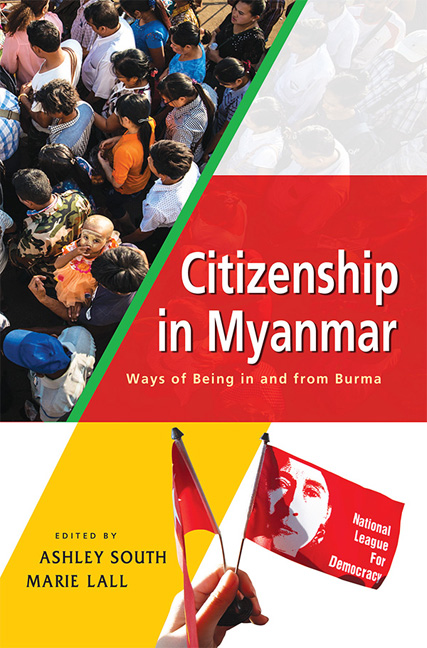Book contents
- Frontmatter
- Dedication
- Contents
- Foreword
- The Contributors
- Map of Myanmar
- Introduction
- 1 Ethnic Politics and Citizenship in History
- 2 Representation and Citizenship in the Future Integration of Ethnic Armed Actors in Myanmar/Burma
- Special Contribution: The Way Forward for Peace, Stability and Progress in Burma/Myanmar
- 3 National Political Dialogue and Practices of Citizenship in Myanmar
- 4 Citizenship and Minority Rights: The Role of “National Race Affairs” Ministers in Myanmar's 2008 Constitution
- Special Contribution: Karenni People at a Glance
- 5 Myanmar's Youth and the Question of Citizenship
- Special Contribution: I Am a Citizen of Myanmar
- 6 “The Value of Life”: Citizenship, Entitlement and Moral Legibility in Provincial Myanmar
- Special Contribution: How I Became Shan
- 7 Conflict and Mass Violence in Arakan (Rakine State): The 1942 Events and Political Identity Formation
- 8 Exploring the Issue of Citizenship in Rakhine State
- Special Contribution: Rohingya and Nationality Status in Myanmar
- 9 Myanmar's Other Muslims: The Case of the Kaman
- Special Contribution: Interview with P'doh Kweh Htoo Win
- Index
Foreword
Published online by Cambridge University Press: 28 June 2018
- Frontmatter
- Dedication
- Contents
- Foreword
- The Contributors
- Map of Myanmar
- Introduction
- 1 Ethnic Politics and Citizenship in History
- 2 Representation and Citizenship in the Future Integration of Ethnic Armed Actors in Myanmar/Burma
- Special Contribution: The Way Forward for Peace, Stability and Progress in Burma/Myanmar
- 3 National Political Dialogue and Practices of Citizenship in Myanmar
- 4 Citizenship and Minority Rights: The Role of “National Race Affairs” Ministers in Myanmar's 2008 Constitution
- Special Contribution: Karenni People at a Glance
- 5 Myanmar's Youth and the Question of Citizenship
- Special Contribution: I Am a Citizen of Myanmar
- 6 “The Value of Life”: Citizenship, Entitlement and Moral Legibility in Provincial Myanmar
- Special Contribution: How I Became Shan
- 7 Conflict and Mass Violence in Arakan (Rakine State): The 1942 Events and Political Identity Formation
- 8 Exploring the Issue of Citizenship in Rakhine State
- Special Contribution: Rohingya and Nationality Status in Myanmar
- 9 Myanmar's Other Muslims: The Case of the Kaman
- Special Contribution: Interview with P'doh Kweh Htoo Win
- Index
Summary
Most of the chapters in Citizenship in Myanmar: Ways of Being in and from Burma are based on papers presented at a July 2015 conference on “Burma/ Myanmar in Transition: Connectivity, Changes and Challenges” held at Chiang Mai University. Additional special contributions come from six community and political leaders from Myanmar, including senior officials of Ethnic Armed Organizations.
Until recently, Myanmar studies focused primarily on democracy and human rights. With the election in 2010, the government embarked on a series of reforms to direct the country towards liberal democracy, a mixed economy, and reconciliation, although doubts persist about the motives that underpin such reforms. This has led to a new democratic system, ethnic ceasefire talks, and the victory of the National League for Democracy (NLD) in 2012. These changes have ushered in a turning point in Myanmar studies — with the focus shifting to how the liberal government will deal with both the country's past as well as the present challenges of representation and the meaning of Myanmar citizenship and national identity for the various ethnic groups in Myanmar. This book examines the practices of citizenship and the role of state and civil society in the linkages between culture, religion, speech, access to land and, most importantly, access to opportunities. The government faces major challenges in trying to unite the various ethnic and religious groups in Myanmar behind its reformist agenda.
The research included here has examined the practices of citizenship in its various aspects — including educational, cultural, religious and ethnic — to investigate whether citizenship is a political instrument for national reform or a representation of national identity. I hope this book leads to a better understanding of our neighbour, including its sociopolitical transition and the implications for regional development — and helps us to further our cooperation with Myanmar.
- Type
- Chapter
- Information
- Citizenship in MyanmarWays of Being in and from Burma, pp. ixPublisher: ISEAS–Yusof Ishak InstitutePrint publication year: 2017

